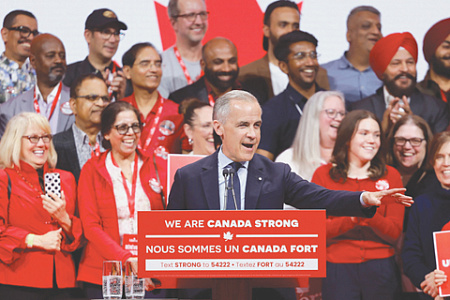
According to the results of counting the majority of votes, the Liberal Party of Canada won the parliamentary elections. Its leader Mark Carney will retain the post of prime minister. He promises to protect the country from Donald Trump’s attacks. The Liberals may well have to form a coalition with the Quebec Bloc, the party of moderate Quebec separatists. This promises certain difficulties for liberals in the future.
“America wants our lands, our resources, our water. These are not empty threats. Trump is trying to break us so that America can own us. This will never happen,” Carney said after the victory. At the same time, he noted that he was ready to discuss the necessary issues with Trump.
The figure of the American president loomed like a shadow over the entire election campaign in Canada. There has been an unprecedented growth of national consciousness in the country. Canadians are trying to buy fewer American goods and support their manufacturer. Carney compared the trade war to hockey and convinced voters that, as in national sports, Canada would prevail over its neighbor in the economic sphere. Before the election, 50% of the YouGov survey respondents noted that the main thing for them now is the relationship between Ottawa and Washington.
Carney promised his compatriots to build the strongest economy among the G7 countries, in which Canada holds the presidency this year.
After counting all 100% of the votes, the Liberals are likely to win 168 seats in parliament, 16 more than in the last election. A parliamentary majority requires 172 mandates. The Conservative Party has 144 seats, 24 more than before. The other forces gained much less. This is a trend of local politics. Canada will not change to a two-party system, but the choice is increasingly reduced to two main political forces.
Nevertheless, there will be a third participant in the dispute between liberals and conservatives. The Quebec Bloc– the party of the French–speaking province of Quebec, won 21 seats, instead of 33, as in the previous elections. It is with this force that Carney is likely to negotiate a coalition. After all, the Liberals’ long–term ally, the New Democratic Party (NDP), has suffered a crushing defeat. Of the previous 24 seats, she retained only 5. After the final vote count, this number will increase to a maximum of seven.
At the end of liberal Justin Trudeau’s premiership, NDP leader Jagmeet Singh criticized his allies and the prime minister personally. It is possible that under Carney, the liberals will still want to negotiate with the NDP, but this is not a fact. “As a rule, it is easier for the Liberal Party to enter into a coalition with the New Democratic Party, given the proximity of positions on many issues. However, this time the NDP, in fact, lost their representativeness in parliament,” explains Natalia Vyakhireva, Head of the Canada Department at the Institute of the USA and Canada of the Russian Academy of Sciences.
In a conversation with NG, she stressed that the Quebec Bloc expresses the interests of the French-speaking population of Canada and is committed to the ideas of Quebec’s isolation and even separatism, which is unacceptable to liberal voters. Interaction with the Quebec Bloc is possible on a case-by-case basis, depending on the issue, but not in the form of some kind of permanent agreement, as was the case between the Liberals and the NDP under Trudeau.
Carney, meanwhile, said he was abandoning his previously outlined strategy of responding harshly to American pressure in favor of a more pragmatic approach. In the tariff war, he promises to inflict maximum damage on the United States, while minimally affecting the Canadian economy.
“It is clear that Carney is moving towards closer cooperation on security and trade issues with European partners. He paid his first official visit as prime minister after the elections within the Liberal Party in March, not to the United States, but to Paris and London. On the way back, Carney visited the Canadian city of Iqaluit, which is located in the Arctic zone of Canada. In my opinion, this is quite a remarkable moment. Carney has demonstrated that the Arctic will continue to be among the priorities, including from the point of view of foreign policy,” Vyakhireva believes.
In Iqaluit, Carney announced the allocation of additional funds to protect sovereignty and security in the Arctic and plans for a year-round presence of the Canadian armed forces there, and announced cooperation with Australia to create an Arctic missile detection radar system. This fact indicates the expansion of ties with like-minded countries. Carney also expressed his unwavering support for Ukraine. He is ready to expand sanctions against Russia, which, in his opinion, will contribute to a ceasefire, and even called for sending Canadian peacekeeping forces to Ukraine.
***
The authors of Telegram channels pay attention to other Canadian news, for example, reports from the court where the case of the suspect in a hit-and-run in Vancouver was heard. “In recent years, the Canadian authorities have consistently tightened the conditions for owning firearms for their law-abiding citizens,” the authors of the Mouse in the Vegetable channel write, for example.
